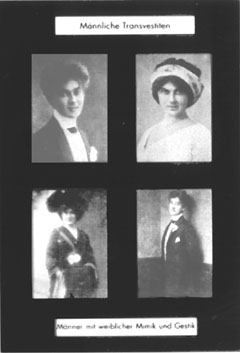The University Record, September 7, 1999 By Jane R. Elgass

An exhibition on “The First Institute for Sexual Science” at the Michigan Union Art Lounge is the cornerstone for several events in September, presented by the Institute for Research on Women and Gender (IRWG) and 14 other U-M units and programs. The events are part of the Project on Gender-Based Censorship.
Magnus Hirschfeld (1868-1935), a German-Jewish sexologist and reformer, opened the Institute for Sexual Science in Berlin-Tiergarten in July 1919, the first of its kind in the world. The institute operated until 1933, when it was shut down and its library burned by the Nazis.
Being gay and Jewish, Hirschfeld frequently was the target of physical violence, and Hitler referred to him as “the most dangerous Jew.” Hirschfeld’s committee in Berlin is considered to be the first gay rights organization. In 1903, it distributed the first known survey on gay behavior. His institute produced Different from the Others (Anders als die Anderen) in 1910, probably the first gay film.
“Politically, the emergence of the Institute for Sexual Science is to be viewed within the context of the progressive reform movements during the Weimar period,” explains IRWG Director Abigail J. Stewart. “Scientifically, the bio-medical explanations of human sexuality at the time formed the framework. The exhibition affords an insight into the institute’s work with to-date unpublished documents, photographs and exhibits.
“We’re happy to bring the Hirschfeld Exhibition to the University for its interdisciplinary appeal,” Stewart adds. “It can be used for class discussions on gender issues, or as historical background in courses on gay/lesbian/transgender history, history in scientific studies and Weimar history.”
The exhibition was curated by the Magnus Hirschfeld Gesellschaft and was displayed in the United States and in Canada last year.
Other events taking place in conjunction with the exhibition are:
Presented by the Rackham Summer Interdisciplinary Institute, the reading of Claire Luckham’s thought-provoking play provides a point of departure for exploring what sexual science means today. When Sal and Ray learn that the fetus Sal carries may have a “chromosome abnormality,” the couple must make a series of highly emotional medical decisions that determine their future and that of the fetus. The play draws on contemporary debates about the politics of medicine and reproductive rights, urging viewers to consider how culturally prescribed notions of “the normal” shape our views on and decisions about our bodies.
Hirschfeld’s film is the earliest known depiction of a homosexual protagonist, and was produced during a post-World War I “window of opportunity,” when Germany had no film censorship. It was directed by Richard Oswald and starred Conrad Veidt, both of whom had distinguished film careers in the 1920s, fleeing the Third Reich for Hollywood. All that remains today is a 25-minute fragment of the 90-minute film.
Hirschfeld scholar James Steakley, Department of German, University of Wisconsin-Madison, will lead a question-and-answer session. Martin S. Pernick, professor of history, will compare the film with American sex education films of the same period.
The Rackham Summer Interdisciplinary Institute will present a discussion on the complex history and workings of Hirschfeld’s theories and the Institute for Sexual Science. Panelists will explore the paradoxical combination of emancipatory social reform projects, such as advocacy for birth control, abortion and homosexual rights, and the simultaneous development of the eugenics movement.
The discussion will be moderated by Gina Bloom, graduate student, Department of English. Speakers will be David Halperin, visiting professor, Department of English; Kristin McGuire, graduate student, Department of History; Sandra Seekins, graduate student, Department of History of Art; Scott Spector, assistant professor, Department of German, and assistant research scientist, Center for Russian and East European Studies; and Dennis Sugrue, clinical associate professor, Department of Psychiatry and Gender Services Program, U-M Health System.
Sponsors, in addition to IRWG, are: Rackham Summer Interdisciplinary Institute; Program in Society and Medicine; History of Medicine and Health Colloquium; Michigan Union; Office of the Provost; Department of Germanic Languages and Literatures; Department of History, Lesbian, Gay, Bisexual Transgender Student Organization; International Institute; Department of Psychiatry; Department of Obstetrics and Gynecology; Women’s Studies Program; Department of Psychology; Program in Film and Video Studies; and Ahava: Lesbigay Jewish Student Organization.

